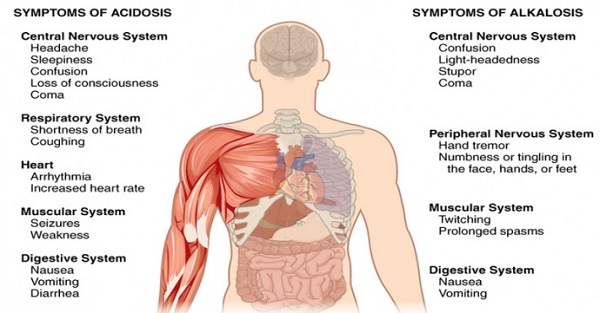

Did you know that some diseases and physical problems are actually brought about by acidity? A majority of the people living in developed nations suffer problems brought about by acidification because their modern lifestyles and diets promote the acidification of their body’s internal environment.
When a body is full of acid, it cannot function as it should. Too much acid in the body creates an unhealthy environment where bacteria, yeast, and illnesses can thrive. When this happens, the body does its best to neutralize and eliminate the acid by taking minerals from bones and vital organs.

18 Signs That Your Body is Too Acidic
When acid levels in your body are high, mineral reserves like magnesium, potassium, sodium, and calcium can get dangerously low, increasing the likelihood of organ and tissue damage that can go unnoticed for years. When the levels reach a critical high, this could lead to something known as acidosis.
The sad truth is that most of us are consuming acid-forming foods like sugar, meats, grains, and dairy on a daily basis. Considering that our bodies are constantly creating acidic waste products through metabolism, this waste needs to be excreted or neutralized in some way. To ensure that acid in your body is neutralized, consider switching up your diet and start eating more alkaline-rich foods.
Health Problems Brought About By Mild Acidosis or Poor pH Balance
– Inflamed and sensitive cavities and gums
– Stiff neck, lumbago, sciatica
– Immune deficiency
– Coughing, shortness of breath, respiratory problems
– Chronic fatigue and low energy levels
– Yeast fungal overgrowth
– Increases heart rate, arrhythmias, heart problems
– Cardiovascular damage, reduction in oxygen levels, constriction of blood vessels
– Diabetes, obesity,
– Kidney and bladder infections
– Premature aging
– Quickened damage of free-radicals
– Bone spurs, hip fractures, weak/brittle bones, osteoporosis
– Diarrhea, vomiting nausea
– Lactic acid buildup
– Aching muscles and joint pain
– Sleepiness, confusion, headaches
– Acne, allergies
Can the Body Adjust pH Levels On Its Own?
Yes! However, this adjustment comes at a price. The standard pH for all fluids and tissues in our bodies, except for the stomach, is normally alkaline. Except for blood, the pH levels in other systems of our bodies range quite widely. These shifts are vital as they help maintain blood pH – which has to be maintained at a very narrow margin of somewhere between 7.35 pH and 7.45pH.
For instance, when your system gets too acidic, your blood will resort to taking up alkaline-forming elements from your small intestine’s digestive enzyme system. This then creates an unhealthy stomach environment that does not support proper digestion. While your body can adjust its pH levels automatically, it does so at the cost of other body systems; something that could lead to extra, unwanted health problems.
Know Your pH
pH testing is vital as it allows you to get a numeric representation of your body’s levels of acidification. Healthy average pH readings range anywhere between 6.75 pH to 7.25 pH. When it comes to body pH, the ideal level is 7.36 pH. For more on pH testing, check the references at the end of this article.
Don’t Rely on Taste to Know If Food Is Alkaline or Acidic
For instance, most of us think that lemons are acidic; and while they are classified as acidic fruits, lemons are actually alkaline-forming food. During digestion, acid from the fruit is oxidized into water and carbon dioxide – making it hard for acidic conditions to be created within the system.
Sodium, Potassium, Magnesium, Iron, and Calcium are the body’s main alkalizing minerals. Foods rich in these minerals are known as alkaline-forming foods while those rich in acidic minerals are known as acid-forming foods. The interesting thing is that most, if not all, foods have both basic and acidic minerals in them.
Know Your Body’s Limits
Our bodies have limits, and there is just so much they can do when trying to balance out acid levels. As such, it is advisable that you eat foods that help maintain acid-alkaline balance. General malaise and other diseases are usually as a result of the body attempting to rebalance its internal environment.
If your diet is comprised of too many acid-forming foods like grains, sugars, dairy, and meat, you’re your system becomes more acidic. On the other hand, if you consume too many alkaline-forming foods like sea vegetables, fruits, and greens, then your system becomes more basic. Balance is key!
How Does The Body Respond to Different Foods?
How your body responds to different foods is determined by your dominant constitutional type. As such, if your dominant constitutional type is more of oxidative, then vegetables and fruits will make your body more acidic. However, if your constitutional type is more dominant towards the autonomic system, then proteins will lead to your body becoming more acidic and vegetables and fruits will shift it to creating a more basic/alkaline environment.

9 Ways to Quickly Alkalize Your Body: How To Improve Alkalinity
– Drink lots of water (alkaline water if possible)
– Check your pH levels regularly
– Instead of your traditional lunch, consider switching to green salads
– Remove all acidic foods from your diet
– Avoid processed foods – consider avoiding coffees, sugars, and soda and replace them with green drinks, herbal coffee, and herbal tea
– Use collard greens and lettuce leaves as wraps
– Add smoothies or green juices to your diet
– Replace milk with almond or coconut milk
You Are What You Eat!
Attaining pH balance will require some thoughtful planning; however, you will appreciate the benefits of your efforts with time when you start feeling more vibrant and energetic and as your overall health starts to improve.
The truth of the matter is that what you eat directly impacts your health. In the words of Hippocrates Health Institute founder, Ann Wigmore, what you eat can either be the poison that kills you slowly or the most powerful and one of the safest forms of medicine. It’s up to you to choose.
References:
Understanding pH
Acidosis
The Alkaline Diet: Is There Evidence That an Alkaline pH Diet Benefits Health?
Diet, evolution and agingthe pathophysiologic effects of the post-agricultural inversion of the potassium-to-sodium and base-to-chloride ratios in the human diet
Minerals and Disease; Journal of Orthomolecular Medicine Vol. 10, No. 3 & 4, 1995; Joseph D. Campbell
Credits:
The Hearty Soul, Real Farmacy.
Source: http://worldtruth.tv/signs-your-body-is-too-acidic-and-9-ways-to-quickly-alkalize-it/






